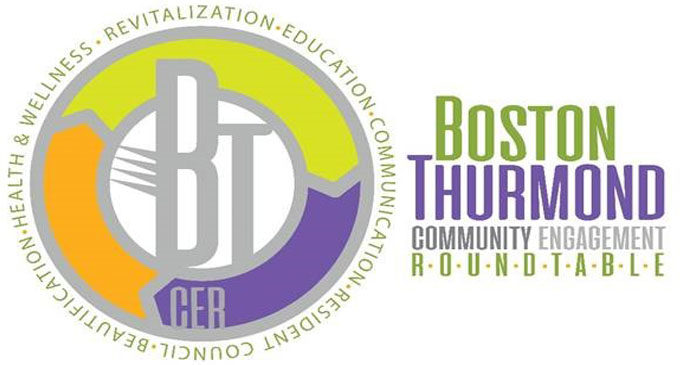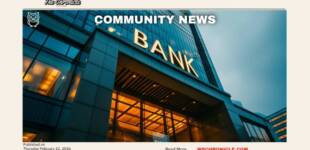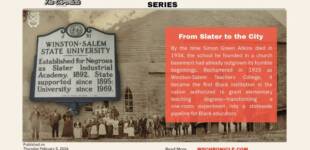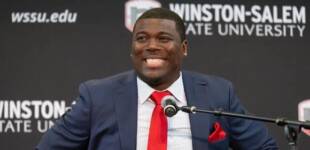CSEM supports a roundtable in the historic Boston-Thurmond community

By John Railey
The Boston-Thurmond community, which includes about 3,000 residents in northern Winston-Salem, faces the same challenges as many historic/up-and-coming communities, including being designated a food desert, the need for more affordable housing, and other challenges aggravated by the pandemic. Unlike many other areas, however, Boston-Thurmond has a burgeoning resident-led, resident-driven group, the Boston Thurmond Community Engagement Roundtable (BTCER) working to improve its community.
“We are about improving Boston-Thurmond,” said Petitesa Mickle, one of the resident members involved in the network.
The network is Boston-Thurmond United (BTU), composed of the Boston-Thurmond Community Engagement Roundtable (BTCER) and the Boston-Thurmond Community Network (BCTN). BTCER members Petitesa Mickle and Sandra Stinson also serve on the BTU. Their involvement is evidence of the active participation by Winston-Salem State University’s staff in contributing to improving neighborhoods. Stinson just recently retired from her position as an accountant technician, and Mickle, who is still employed as an administrative professional, are part of an important link, that of the Winston-Salem State University family giving back to the neighborhoods in which they live.
The proximity of the Boston-Thurmond neighborhood to WSSU, combined with the active participation of WSSU staff, created an opportunity for WSSU’s Center for the Study of Economic Mobility (CSEM) to present the roundtable with an Economic Mobility award. The CSEM award came with a stipend that helped the roundtable work with a consulting firm to design and develop the formation of the BTCER to support an effort aimed at increasing residents’ participation in shaping the future development of their neighborhood.
The roundtable’s works requires tenacity. It seeks to be a united force, a collective voice, and a platform for engaging and supporting residential participation. Boston Thurmond, a diverse community of residents that is primarily African American but also includes whites and Latinx, is committed to working together to address current challenges and create a master plan for community revitalization and economic development.
Achieving neighborhood participation and ownership is not an easy accomplishment. The BTCER began its work three years ago. This was when Winston-Salem North Ward Councilwoman D.D. Adams secured initial funding for the consultants for the roundtable. Today, the BTCER in partnership with BTU, is a designated Purpose Built Communities’ partner, a national initiative that puts residents first in revitalizing their neighborhoods because, Stinson said, “the residents’ voices needed to be heard in the conversations about revitalization in Boston Thurmond.” The roundtable facilitated the participation of residents in the formation and support for revitalization initiatives or new ventures coming into the neighborhood.
Stinson said several roundtable members have attended Purpose Built Conferences and have visited a Purpose Built community “… to learn from them and their work getting started. We have similar structures and can benefit from their experiences and not recreate some of the initial work. Some of the Purpose Built sister communities are young, like we are, and others are more established.”
BTCER planning teams’ goals are to address issues including affordable, mixed-income housing, safety and neighborhood beautification, and education. Regarding affordable housing, Stinson said, “There is such a shortage of affordable housing for single parents. We would love to see a young, single mother be able to afford a home with access to parks and grocery stores. One education concern is the need to support our neighborhood schools in Boston-Thurmond and to encourage students returning to these schools. We believe every child in the community should have access to quality education.”
The roundtable, which includes stakeholders – prior residents, business partners and other community partners who reside outside the community but have taken in interest in and participate in the work – is strategically pursuing community engagement activities to enlarge our numbers. The BTU is composed of representatives from Wake Forest University, Novant Health, Wake Forest Baptist Medical Center, the Kate B. Reynolds Charitable Trust, and the Z. Smith Reynolds Foundation. The community engagement initiatives seek to strengthen the important work of connecting the historic significance of Boston-Thurmond to the innovation and revitalization structures in the greater city of Winston-Salem.
“With our relationship with Novant Health, Boston-Thurmond is the benefactor of a health clinic van in the community for those without insurance,” Stinson said. “With the Goler CDC, the community will benefit from a hydroponic garden that will help address the food desert issue.” In such gardens, popular in urban areas, plants are grown not in soil, but with water and nutrients.
There are approximately 26 members on the BTCER. Stinson and Mickle want to grow that number, especially among younger residents who they want to encourage to stay in the community. But the pandemic has complicated the “reaching out to residents” opportunities.
“We have a lot of residents who may not have computers,” Mickle said. “They’re interested, but they are not able to join the Zoom meetings at this time. We had a real good community engagement push until COVID started.”
Stinson said, “It’s one step at a time, we’re getting this done together.”
They will keep pushing forward, building on a good future for their community.
John Railey, raileyjb@gmail.com, is the writer-in-residence for CSEM. For more information visit www.wssu.edu/csem.









